Picture of Fragmented NJ Startup Scene Emerges from LaunchNJ, Publitics Survey
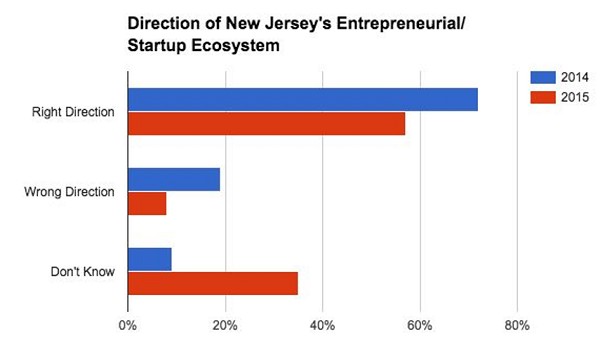
New Jersey entrepreneurs appear to be confused about where the state’s startup ecosystem is heading, and they continue to be vexed by such issues as the availability of capital, access to talent and support from the state and local governments. And many see the startup ecosystem here as “dispersed,” “active but separate,” “disjointed” and “weak and fragmented.”
This is according to a survey of 115 members of the New Jersey entrepreneurial and startup community undertaken by LaunchNJ (Summit) and PubliticsPR+Digital (Caldwell) last month. The survey quizzed both tech and nontech startup founders and other members of the ecosystem. NJTechWeekly.com covered the inaugural survey, conducted in 2014, here.
For the first time, the survey featured an open-ended question that asked the respondents, “If you could say one thing about the New Jersey startup/entrepreneurial ecosystem, what would it be?”
On a positive note, survey participants did have good things to say about the folks who work tirelessly to connect the dots in the ecosystem.
“There are a bunch of individuals who are working relentlessly to make improvements and bring us together. I’m happy to know a few of them and appreciate all that they are doing,” one respondent said.
Another added, “It’s been great seeing an increase in the number of Meetups in the area. There are some strong community organizers doing a great job driving this effort.”
Many participating in the survey thought that New Jersey’s startup/entrepreneurial ecosystem had yet to develop a strong brand.
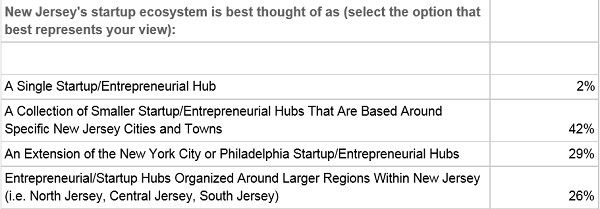
Some 42% of respondents felt that New Jersey’s ecosystem was made up of a collection of smaller hubs based around cities or towns. Almost a third of the respondents (29%) reported that they felt that the state’s ecosystem was an extension of the larger hubs in New York City and Philadelphia, while about a quarter (26%) believed it was organized around larger geographic regions like North, Central, and South Jersey
Bristling about this lack of coherence, one participant said, “New Jersey has been catering to NYC and Philly for many decades. It needs to have its own identity and brand.” He or she then suggested, “Open up land for new housing and commercial development. That will solve housing and talent problems, fueling [the] ecosystem and growth.”
Another noted, “The ecosystem almost needs to develop a brand about itself so that people in the state/region know that N.J. is a viable place to start a startup, similar to how ‘Silicon Valley’ is a brand for the state of CA.”
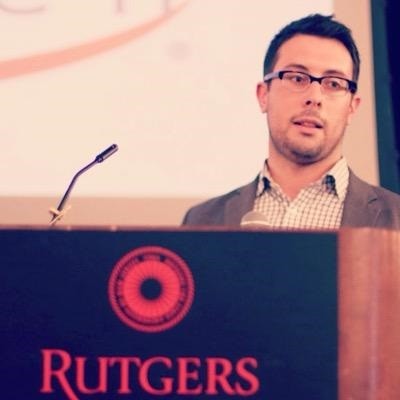
Matt Krayton, Publitics founder and principal, commented that the New Jersey “entrepreneurial and startup community hasn’t quite come around to a single definition of what the ecosystem looks like here.” He added, “Almost a third take the ‘keg tapped at both ends’ view, which is pretty remarkable, while over half see a collection of a number of smaller hubs. It shows that a strong brand hasn’t yet emerged.”
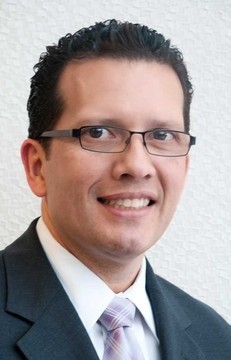
Carlos Abad, founder of LaunchNJ, took note of a “disconnect” in the ecosystem brought out by the survey. He pointed out that the respondents didn’t find it particularly hard to get customers for their products or services, but they did find it “very challenging to get funding.” He also noted that New Jersey entrepreneurs might tend to see pre-revenue deals coming out of Silicon Valley or New York, and “think that raising money is the only way to scale and find customers, but that’s exceedingly rare.”
LaunchNJ is working on educating entrepreneurs, he said. “We want savvy entrepreneurs who can bootstrap, develop a great product, validate the business, then raise money when necessary.”
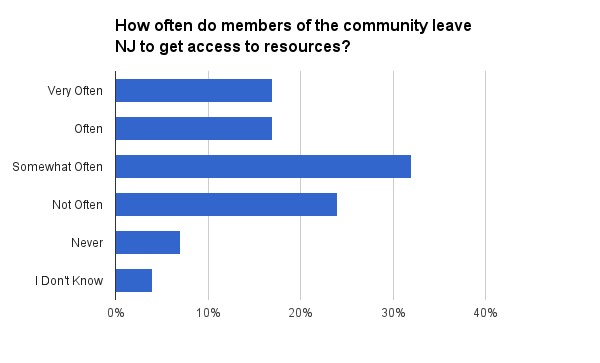
While most of the findings of the survey remained stable from 2014 to 2015, there was a change in how members of the community felt about the direction in which New Jersey’s tech ecosystem was heading — and not for the better. Just over half of the respondents (57 percent) thought that the ecosystem was headed in the right direction. But In 2014, that figure was 72 percent!
However, those who reported that the ecosystem was heading in the wrong direction dropped by almost half from last year, to roughly nine percent. Those who were uncertain peaked at 35 percent, up almost four times from 2014, according the survey.
Krayton noted that, while there may have been progress in 2015, members of the community were feeling unsure as to whether the small, but positive changes, would come together to create bigger change.

